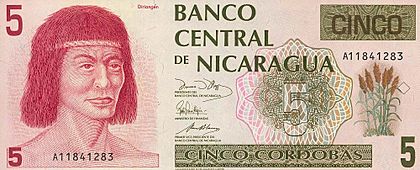Diriangén facts for kids
Diriangén was a powerful native king from Nicaragua. He ruled a large area of land, from Diriamba in Carazo to the Ochomogo river in Rivas. This land was next to, but separate from, the kingdom of another chief named Nicarao. Historians believe Diriangén might have been part of the Chorotega people.
Contents
What Diriangén's Name Means
The name Diriangén is special. It combines two parts: Dirian and gen. Dirian meant "people of the hills," which was the name of the tribe Diriangén led. Gen was an important title, like "chief" or "leader," used in the Oto-Manguean languages spoken by many native groups.
Diriangén's Early Life
Diriangén was born in 1497. From a young age, his mother encouraged him to learn important skills. He practiced using swords and studied different war tactics. These lessons helped him become a strong leader later on.
Standing Up to the Spanish
In April 1523, a Spanish explorer named Gil González Dávila arrived in Nicaragua with his soldiers. They began to convert the native people, including those from towns like Ochomogo and Mombacho, to Catholicism. This meant asking them to give up their traditional beliefs.
Diriangén decided to act. He arrived in a town called Gotega with a large group of people. He brought five trumpeters, five flutists, five hundred men carrying ducks, and sixteen women with golden axes and plates.
The Spanish demanded that Diriangén and other local chiefs be baptized and stop following their old religions. Diriangén refused. He promised to return in three days.
True to his word, Diriangén came back with a huge army of four thousand Dirian and Nagrandano soldiers. They attacked the Spanish troops, forcing them to run away to the south. However, the Spanish quickly regrouped. They fought back and defeated Diriangén's rebel army in less than a day.
A Hero for Nicaragua
Even though his rebellion was defeated, Diriangén remains a very important figure in Nicaragua. He is seen as a symbol of national pride and a hero who stood up against colonial rule.
See also
 In Spanish: Diriangén para niños
In Spanish: Diriangén para niños
 | Victor J. Glover |
 | Yvonne Cagle |
 | Jeanette Epps |
 | Bernard A. Harris Jr. |


